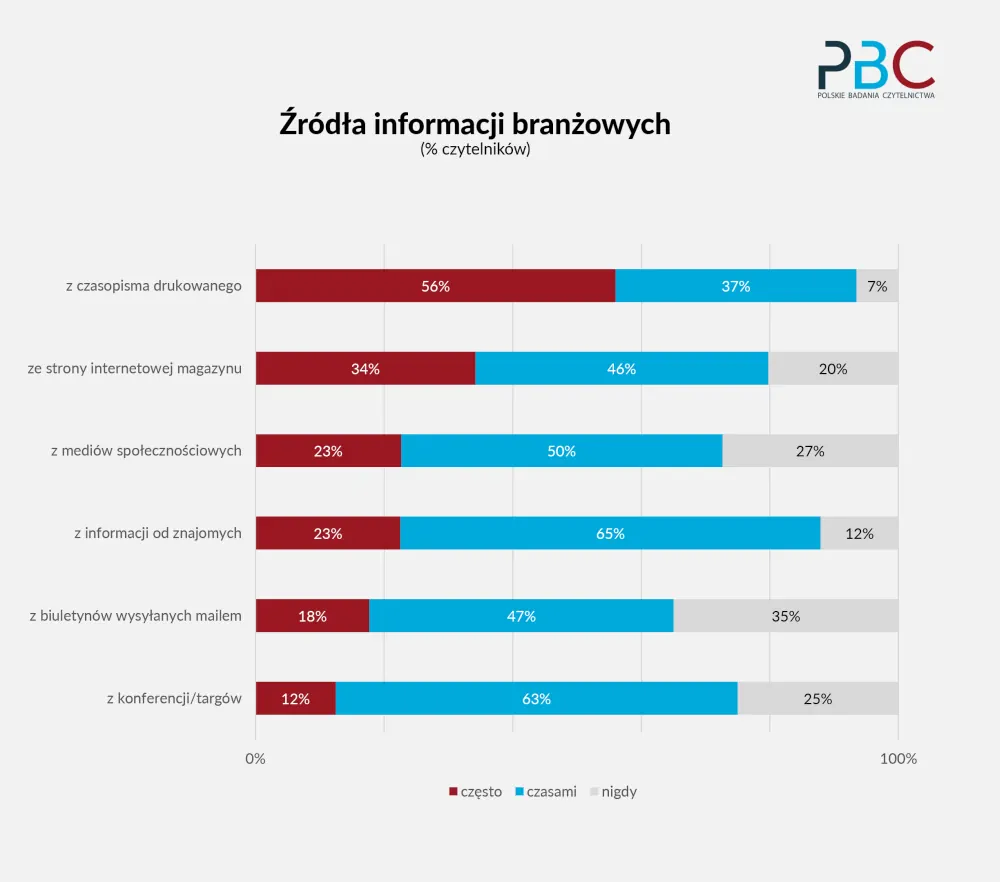 illustration: bing.com/create
illustration: bing.com/createInterest in industry press is shown not only by professionals seeking current knowledge but also by advertisers, for whom it is a well-targeted communication channel with potential clients. Industry titles ensure almost 100% certainty of reaching a full audience of professionals in a given industry, which is a unique characteristic of this category of media. It is an attractive marketing channel, especially for businesses offering B2B services and products.
Readers of industry press are not only people performing specific jobs; they are also individuals keenly interested in developing their skills and knowledge. Industry press is read thoroughly and intensely.
- 91% of readers claim they have read professional titles for 3 years or longer.
- A staggering 81% of people return to previously read issues of magazines at least two times or more.
- 70% of readers share the magazine with others. For respondents, it is an important, key, and primary source of information.
The dominant form of distribution is printed titles received directly at work or home. They serve as the main source of information for professionals. Reading industry magazines allows one to stay updated on professional topics; the knowledge gained from these publications encourages further information searches and discussions with acquaintances. As many as 93% of readers rate industry publications as high quality.
 source: PBC
source: PBCMore than 40% of readers take further actions after reading advertisements - they search for additional information online, visit physical or online stores, want to try the product or service, and consider purchasing it.
When choosing products, readers of industry magazines primarily consider high quality; price, customer reviews, brand recognition, and innovation are also important factors in their decisions.
Research partners: Inżynier Budownictwa, Ogólnopolskie Pismo Rynku FMCG Hurt & Detal, Szef Kuchni Magazyn Branży Gastronomicznej, Top Agrar Polska, Tygodnik Poradnik Rolniczy, Wieści Rolnicze, Zawód: Architekt.
The research was conducted from May to June 2024 using an online questionnaire. It was carried out among readers of industry magazines and supplemented with data from the PBC Audit regarding the distribution forms of industry titles.
The detailed report on the conducted research can be found here: https://www.pbc.pl/czytelnictwo-pism-branzowych-2024/
COMMERCIAL BREAK
New articles in section Media industry
Freelancers 2025 in media and advertising. Useme report
Krzysztof Fiedorek
The modern media and communication market presents entirely new challenges for independent creators. Traditional services are giving way to more complex forms of messaging. The most popular industries in which Polish freelancers operate focus on companies' online presence and visual content.
Video content in Poland. What and how we watch
Paweł Sobczak
Video content is watched remotely, but streaming services are mainly enjoyed in the comfort of home. This is how the consumption of audiovisual content by Poles in 2025 can be summarized. This is the result of an analysis of a study conducted by SW Research and data from the company MEGOGO.
How artificial intelligence misrepresents the news. PBC analysis
Sylwia Markowska
In news summaries generated by the most popular models in Polish, as many as 46% of responses contained at least one significant error, 27% had serious issues with sources (missing, misleading, or incorrect), and 19% contained hallucinations and outdated information.
See articles on a similar topic:
Media in the Balkans and Turkey
Michał Kuźmiński
The Balkans have long been referred to as a “melting pot,” and for good reason. This region is highly diverse and quite unstable. Consequently, the media landscape here is varied as well. In some places, such as democratic Greece, a member of the European Union, the media market is stable and easy to navigate.
Blogs in E-commerce. Report by Elephate and Senuto
KrzysztoF
The average number of indexed articles on e-commerce blogs is 565, with each post attracting 347 readers per month. The health industry generates the highest organic traffic per single article. The authors of the "E-commerce Blog Ranking" take a behind-the-scenes look at the commercial blogosphere.
Press Readership in Poland. The Wealthy Read Ten Times More Often
BARD
Wealthy individuals in Poland read newspapers and magazines up to ten times more frequently than the average Pole, according to a report by Polish Readership Research. They mainly read monthly magazines and dedicate about an hour per day to reading. Only 18% of people in this group do not read any press at all.
Music for Overstimulated Children: Research from Polish Kindergartens
OOO
Hyperactivity, impatience, and difficulties with concentration are increasingly common challenges faced by preschool and school-aged children. An excess of stimuli, including digital ones, makes it hard for children to focus on a single task. Is there anything that can be done about it?





























